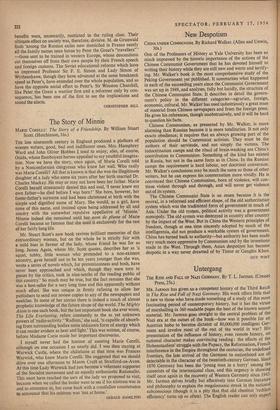The Story of Minnie
MARIE CORELLI : The Story of a Friendship. By William Stuart Scott. (Hutchinson, 16s.) THE late nineteenth century in England produced a plethora of women writers, good, bad and indifferent ones. Mrs. Humphrey Ward and John Oliver Hobbes I used to enjoy; also, of course, Ouida, whose flamboyant heroes appealed to my youthful imagina- tion. Now we have the story, once again, of Marie Corelli told by a Nonconformist clergyman who knew her well. Who really was Marie Corelli? All that is known is that she was the illegitimate daughter of a lady who some six years after her birth married Dr. Charles Mackay. He may or may not have been her father. Marie Corelli herself strenuously denied this and said, 'I never knew my own father—he died before I was born!' She bore, however, her foster-father's surname and had been christened at birth with the simple and dignified name of Mary. She would, as a girl, have none of this name, and insisted upon being addressed by all and sundry with the somewhat repulsive appellative of `Minnie.' Minnie indeed she remained until her nom de plume of Marie Corelli became so famous that she used it exclusively for the rest of her fairly long life.
Mr. Stuart Scott's new book revives brilliant memories of this extraordinary woman, but on the whole he is strictly fair with a mild bias in favour of the lady, whose friend he was for so long. James Agate, whom Mr. Scott quotes, describes her as 'a squat, tubby, little woman who pretended to a non-existent ancestry, gave herself out to be ten years younger than she was, wrote a series of novels which, for pretentiousness and bosh, have never been approached and which, though they were torn to pieces by the critics, took in nine-tenths of the reading public of this country.' So much may be true, but the fact remains that she was a best-seller for a very long time and this apparently without much effort. She was unique in firmly refusing to allow her publishers to send out review copies to any of the newspapers and weeklies. In some of her stories there is indeed a touch of almost prophetic knowledge of the future shape of the world. The Mighty Atom is one such book, but the last important book she ever wrote, The Life Everlasting, refers constantly to the as yet unknown powers of `radio-activity.' Radium,' she said, 'is capable of absorb- ing from surrounding bodies some unknown form of energy which it can render evident as heat and light.' This was written, of course, before Madame Curie made her important discoveries.
I myself never had the honour of meeting Marie Corelli, although on one occasion I so nearly did. I was then staying at Warwick Castle, where the chatelaine at that time was Frances Warwick, who knew Marie Corelli. She suggested that we should drive over one afternoon to Mason Croft at Stratford-on-Avon. At this time Lady Warwick had just become a vehement supporter of the Socialist movement and an equally enthusiastic Rationalist. This must have reached the ears of the lady we proposed to visit, because when we called the butler went to see if his mistress was in and to announce us, but came back with a crestfallen countenance to announce that his mistress was 'not at home.'
GERALD HAMILTON


































 Previous page
Previous page